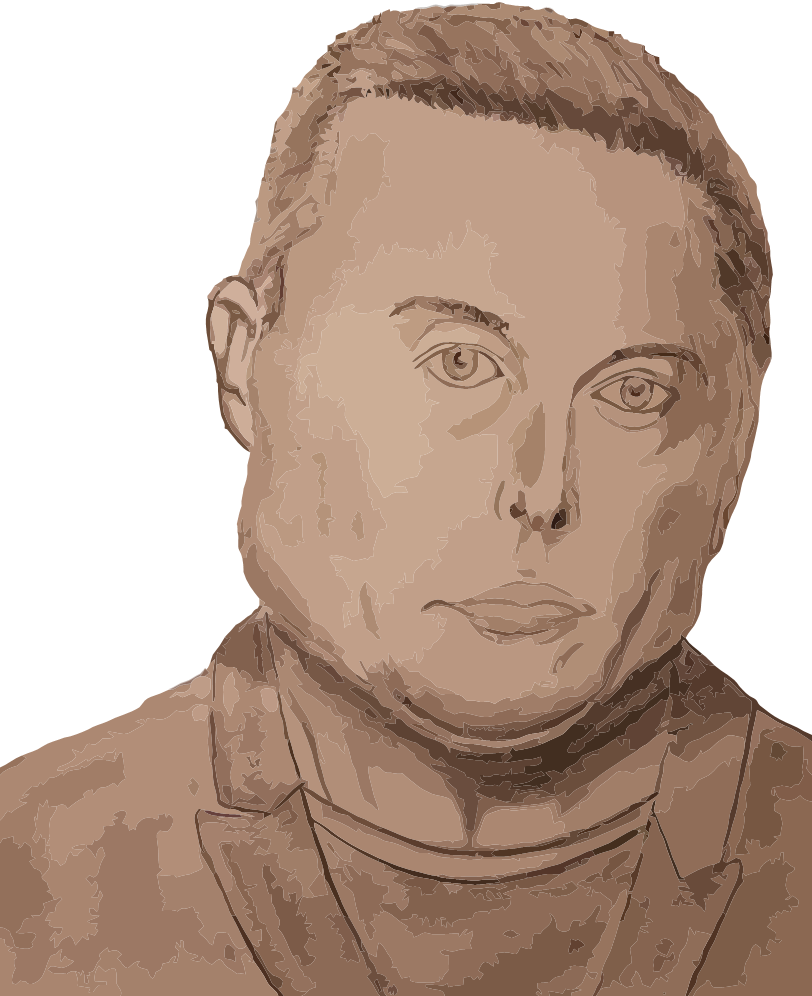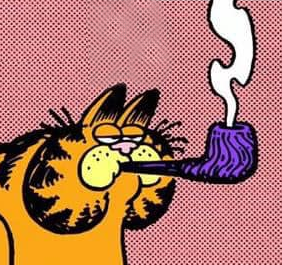People on the internet are saying it’s not a condemnation of religion and to Marx opium means medicine, Im confused help me bear website!
Edit: what did Karl Marx think opium was?
The quote’s been posted, but it’s really more of an observation; it’s a symptom of the state of things, and should be interpreted through that lens. Think of it less as a moral evil and more as the 19th century equivalent of our bullshit Treat Discourse. People saw religion as a path to salvation from their very real, material problems, even though it’s just a way of interpreting our perception of the world. It’s less common today, at least in America. Now we have Elon worship
 and the rise and grind hustle culture bullshit, and whatever else people fixate on as they yearn to be free of the yoke of oppression in the various forms it takes.
and the rise and grind hustle culture bullshit, and whatever else people fixate on as they yearn to be free of the yoke of oppression in the various forms it takes.If Marx calls religion opium what did he think opium was? Was opium to him tylenol or fentanyl? People back then used cocaine for tooth aches. It changes the meaning of the quote a great deal depending on how hard of a drug he thought opium was.
Was opium to him tylenol or fentanyl?
Yes. Those are both painkillers, and each has its use in medicine. If your gran was laid up in the hospital with a borken hip, they’d likely give her fentanyl for the pain. Funny enough, fentanyl is just a medical grade heroin (or, as it’s also called, opium).
When Marx was writing, cocaine, alcohol, and opium were just about it for modern medicine. Of those, opium had the fewest side effects. It killed your pain and, as long as the dose wasn’t extraordinarily high, it didn’t kill you. That was it. Compared to alcohol or cocaine, it was by far the ideal treatment. Remember, penicillin wouldn’t be discovered until the 20th century – at this point in history, you’d be lucky if your barber-surgeon was cleaning his blades between patients, let alone washing his hands!
People knew opium got you fucked up, soothed pain, and could ruin your life if you let it keep seducing you. They learned pretty quick that laudanum junkies weren’t generally successful people.
It can be both. Religiosity is a spectrum. You can be casually religious for the community and maybe adhere to some passages here and there (Tylenol - though it’s not an opioid) or you be someone who kneels down and sobs as he prays to the Holy Spirit and donates hundreds of dollars each Sunday (fentanyl)
It soothes your misery one way or another. You can still be aware of the material conditions and be a self proclaimed religious person.
Probably more like booze. A way to self medicate away the horrors of reality when there seems to be no other way to deal with them.
Marx isn’t anti-religion because “lol man in the sky silly”. Marx is anti-religion because it is the product of an inverted world, a class society. Marx believes that, if class society is abolished, if the topsy-turvy (this is the word he uses in e.g. “On ‘The Jewish Question’” or the rest of “Contribution to the Critique of Hegel’s Philosophy of Law”) world is turned upright, religion will wither away into nothing. Marx believes this is only possible when all the social relations that underlie society are laid bare in an understandable form (i.e. with communism), and that it will not disappear until the topsy-turvy material world disappears.
As Marx states in the former essay, Marx doesn’t believe religion can be abolished by decree (and he points out that state secularism is often just reskinned Christianity). In both essays, Marx actually details how the state itself, money itself, are religions; for Marx religion is the work of human mind alienated from humans and dominating them.
In the full quote (which emizeko posted) Marx outright refers to religion as the general theory of this world (i.e. the topsy-turvy world), as an encyclopaedic compendium. Elsewhere (either in Contribution to the Critique or in On the Jewish Question) Marx refers to religion as a register of the theoretical struggles of mankind. Based on Marx’s usage of various bible quotes and themes in his work (even Capital), it seems likely that he treated religion as he would e.g. liberal economists or members of parliament (i.e. with critical analysis and an eye towards useful stuff for his own critique)
Marx meant that religion provides an outlet for the material problems of the oppressed and thus runs counter to revolutionary action at its core. We know this doesn’t mean religious people can’t be revolutionary, but he did make a good point about it having the capacity to distract or to act as a substitute for demanding material change.
I recently heard a local Muslim religious leader give a speech about Palestine. This particular person decided to focus on “the” meaning of hijab (it of course means different things in different contexts) and to then say that as Muslims, it must be understood that this unbearable suffering in Palestine is only temporary, that it can be accepted because the afterlife will vindicate them.
On one hand, I would not criticize anyone for using religion as a way to heal from oppression. At the same time, you can see how “only the next life matters” could lead someone to place less emphasis on materially fighting against oppression and therefore do a worse job of opposing it.
We of course see this kind of thing in all religions, they provide explanations for injustice that usually place blame outside of what can be materially helped and justice that is entirely outside the scope of our lives. Many have the same basic idea that this life is temporary and doesn’t matter in comparison to the infinite later (whatever that might be).
When it comes to organized religion, one can also see how it becomes merged with the ruling class, becoming an inherent component of social order and control and adapting its beliefs to what is needed by the ruling class. For example, early Christianity was pretty clear about all interest on debts counting as usury. There was no distinction in language whatsoever. But the Roman ruling class depended on debt, so the distinction was invented and suddenly there were good moneylenders and bad moneylenders and the ruling class’s status quo was - you guessed it - good moneylenders!
Anyways, I’m getting off-track. Marx was talking about religion offering a false consciousness that detracts from revolutionary behavior.
I do think I should probably mention something else, though: many communist movements attempted to impose atheism and/or very strict secularism on populations that were not receptive to it and thereby shot themselves in the foot. It’s good to understand Marx’s point about what religion can offer and do but to not take it to a false extreme that deposing religion is the first priority. You’ll end up, ironically, actually feeding organized religion that will redirect revolution away from being proletarian, as the people you should be able to recruit and radicalize will instead go to the alternatives, including religious organizations.
He’s saying that religion takes the pain out of peoples lives by giving them ideas that make living less painful. Marx wants to get rid of the material conditions that cause suffering, so that people will no longer need religion.
The quote is about using materialist political movement to mitigate peoples suffering, not really about religion.
Yeah, the best interpretation is that a communist mode of production would remove the need for the pain dulling opiate that is religion.
The allegory actually holds up on terms of the war on drugs, where fighting against the medication that people give themselves while in pain and despair doesn’t solve the underlying pain and despair, but building communities and reducing the harm that those drugs cause will over time reduce the abuse of those drugs.
Like in a socialist case, providing alternative organizational structures to churches and allowing those seeking to leave an abusive or conservative church to have a safe haven where they are respected outside their “opiate of the masses” consumption is healthy. But at the end of the day the drugs aren’t what’s causing the problem, it’s the societal structures that drive people to use them that’s the problem.
anticommunists chop it to a sentence or two. read the quote with more context:
The foundation of irreligious criticism is: Man makes religion, religion does not make man. Religion is, indeed, the self-consciousness and self-esteem of man who has either not yet won through to himself, or has already lost himself again. But man is no abstract being squatting outside the world. Man is the world of man – state, society. This state and this society produce religion, which is an inverted consciousness of the world, because they are an inverted world. Religion is the general theory of this world, its encyclopaedic compendium, its logic in popular form, its spiritual point d’honneur, its enthusiasm, its moral sanction, its solemn complement, and its universal basis of consolation and justification. It is the fantastic realization of the human essence since the human essence has not acquired any true reality. The struggle against religion is, therefore, indirectly the struggle against that world whose spiritual aroma is religion.
Religious suffering is, at one and the same time, the expression of real suffering and a protest against real suffering. Religion is the sigh of the oppressed creature, the heart of a heartless world, and the soul of soulless conditions. It is the opium of the people.
The abolition of religion as the illusory happiness of the people is the demand for their real happiness. To call on them to give up their illusions about their condition is to call on them to give up a condition that requires illusions. The criticism of religion is, therefore, in embryo, the criticism of that vale of tears of which religion is the halo.
from https://www.marxists.org/archive/marx/works/1843/critique-hpr/intro.htm
Religious suffering is, at one and the same time, the expression of real suffering and a protest against real suffering. Religion is the sigh of the oppressed creature, the heart of a heartless world, and the soul of soulless conditions.
Man. Shit makes me tear eyed tbh. It seems he’s more sympathetic towards religious people than any of these capitalist freaks considered evangelicals and dominionists.
I read it. I was just hoping to get some interpretations from people.
My interpretation is that religion itself should be opposed, but not in the sense that the “new atheist” might oppose it as an expression of their own intellectual superiority but in a way which is informed by an understanding of what religion is and what purpose it serves within bourgeois society. To remove the need for the opiate by treating the affliction which causes the pain that it soothes, not to withdraw the opiate without addressing the pain.
What’s your interpretation?
That religion will wither away once human suffering ends and hostility towards religion is a bad thing unless religion is acting as the state doing oppression on people. I dont know. Personally Im an atheist, Im kind of interested in atheistic takedowns of the r/atheism crowd, I guess Im interested in learning what bad atheism is.
My fault for not asking the question better. If he’s calling religion opium I need to know what his opinion about drugs was because it changes the meaning a bit of the quote.
This was written a year after the first opium war, and twenty years after confessions of an english opium eater. Opium has (and had) long been in the zeitgeist as seductive, panacea, dream-like, destructive.
I don’t read it as supportive of either
Reading the whole quote, especially that whole paragraph, it appears that Marx is saying that opium is both medicine and drug. It is both a comfort and an escape. It’s a way for dealing with the suffering of reality – without actually engaging with reality. At least that’s my read.
To extend this metaphor a little more, I think he’s also implying that religion acts as a sort of social anaesthetic, dulling the suffering that the masses experience, while not treating the root cause of the ailment itself.
It being a “medicine” is a good point that I haven’t considered tbh. Like most drugs, there are legitimate applications that will absolutely help the patient’s life without hurting him. We just need to reach the conditions to achieve that
Yeah, like how opiates today still have very valid medical uses, but their application has become so widespread that they’ve left the realm of medical tools (for many people) and entered the realm of escapism.
When people aren’t turning to religion because of their total fear of destruction and destitution by capitalism, and the churches themselves begin to take on a more community organized and driven structure, you’ll see the “true” form of religion emerge and over time the need for that religion will fade as the needs that were sated by religion becomes sated by the community as a whole.
Or at least the religion begins to take on the form of the socialized society that it exists in as opposed to impressing it’s own hierarchical structure on the society that seems it out.
The quote means something like this: “Religion is used as a way to escape the crushing reality of the world and dull the meaninglessness of being a common person”
Imagine if you broke your leg. You’d very much welcome some opium (or painkillers in a modern setting) but we all know the solution is to go to the hospital and get it fixed. Marx is warning against mistaking the lack of pain for healing.
Religion is a way to soothe the pain of capitalism/feudalism but it would be better for that pain not to exist.
That’s not exactly Marx’s critique of religion. Marx was saying that by surrendering to a “higher power”, people who are miserable under capitalism forget that it is the human agency that drives societal change.
This is the materialist critique of religion. It is an impediment to progress not because it is “backward” or conservative, but because people have to give up their agency in the process.
This is the materialist critique of religion. It is an impediment to progress not because it is “backward” or conservative, but because people have to give up their agency in the process.
However it should be noted that with the rise of “modernity” in Europe, with the idea that “man makes his own history”, the interpretation of Christianity that prevailed at the time, was one in which the message the message of Christ was one that encourages human beings to the actors of their own history. That is how Christianity and modernity in Europe could exist at the same time, the religion of Christianity was re-interpreted and adapted to the political and social needs of the time in the region.
…The message of Christ may, then, be interpreted as a summons to human beings to be the actors of their own history. If they act properly, that is, if they let themselves be inspired by the moral values which he enacted in his life and death, they will come closer to God in whose image they have been created. This is the interpretation that eventually prevailed and has given to modern Christianity its specific features based on a reading of the Gospels that enables us to imagine the future as the encounter between history as made by human beings and divine intervention. The very idea of the end of time, as brought about by an intervention from outside history, has vanished.
The break extends to the whole area that was until then under the sway of the holy law. Undoubtedly, Christ takes care to proclaim that he has not come to this earth to upset the Law (of the Jews). This is in accordance with his core message: he has not come to replace ancient laws by better ones. It is up to human beings to call these laws into question. Christ himself sets an example by attacking one of the harshest and most formal criminal laws, i.e., the stoning of adulterous wives. When he says “those who have never sinned should throw the first stone,” he opens the door to debate. What if this law was not just, what if its only purpose was to hide the hypocrisy of the real sinners? In fact, Christians are going to give up Jewish laws and rituals: circumcision disappears and the rules of personal law are diversified, insofar as the expansion of Christianity outside of the Jewish world proper adapts itself to different laws and statutes. A Christian law, which anyway does not exist, is not substituted for the latter. Also, alimentary prohibitions lose their power.
- Samir Amin, Eurocentrism Second Edition, pages 42-43
It actually incredible how many pastors, especially modern day protestant evangelical church pastors, do not understand this concept and retreat back into dogmatic beliefs. Literally going back to Middle Age interpretations of Christianity.
One could argue - from a liberation theology perspective - that you can have (and perhaps even need) both.
Hard to do a revolution with a broken leg. You need something to soothe the pain if you want to get back into the fight.
But opium won’t fix your leg, you will be a one-legged person in a war.
No. But it’ll keep you from thrashing in pain while they set the splint.
Marxism is usually against religion, but it also isn’t utopian, it recognizes (indirectly) that it’s basically impossible to eradicate. Someone will always be suffering no matter how autonomous and luxurious and gay the communist society is. There will always be some sort of opium for the masses as a result.
I say usually because there have been self proclaimed Marxists who did great damage to the movement by being obsessed with religion like Pol Pot or random hippie terrorists who casually read Marx and think abusing their members is revolutionary
Though Marx is ultimately anti religion, there are several passages in which he laments the corruption of religion. That it’s supposed to be the worship of god, but instead it has been captured and repurposed into the worship of man and capital with a supernatural guise.
Since others have posted the full quote, I’ll post Samir Amin’s interpretation of it:
Nevertheless, another reading can be made of Marx. The often cited phrase–“religion is the opium of the people”–is truncated. What follows this remark lets it be understood that human beings need opium, because they are metaphysical animals who cannot avoid asking themselves questions about the meaning of life. They give what answers they can, either adopting those offered by religion or inventing new ones, or else they avoid worrying about them.
In any case, religions are part of the picture of reality and even constitute an important dimension of it. It is, therefore, important to analyze their social function, and in our modern world their articulation with what currendy constitutes modernity: capitalism, democracy, and secularism… It will be seen that the [Abrahamic] religions in question have been subject to successive interpretations, which have enabled them to survive, adapt to gigantic social transformations, and even participate in those transformations.
For modern interpretations one can read “opium” as “morphine”.
Whenever you are reading any literature you have to be concious of the historical period the writer, at the time they were writing the book you’re reading, lived in.
An example of this, using Stalin as an example, is looking at how different the world was in 1901 when Stalin wrote The Russian Social-Democratic Party and its Immediate Tasks and 1952 when Stalin wrote Economic Problems of Socialism in the USSR.
This means working to understand what they are saying within the historical context of when they lived and not applying your own modern perceptions onto their works - at least not initially in my opinion.
I should point out that Marx certainly wasn’t against religion in the same way as his contemporaries like Bruno Bauer or Max Stirner. Those two in particular were edgy fedora style atheists of their time. They saw religion as simple ignorance or society wide brainwashing. They viewed religion as holding tendrils around a person’s mind, and once that was broken, a person could achieve freedom. Marx saw a person’s freedom as intrinsic to their material and social conditions. Religion is there as medicine to soothe suffering caused by a lack of freedom.
Socialist states have typically had to grapple not simply with religion, but religious organizations. The Orthodox church in the Soviet Union for instance was previously an aspect of the administrative state for Tsarist Russia. Those kind of organs don’t simply disappear overnight, they have to be uprooted. The church acted as social infrastructure for Russian/etc peasants. The school, tax collector, bureaucracy, library, hospital. Sometimes all of that was contained within the local church. You can’t have a socialist administrative state if you have a remnant of the previous society integrated within people’s lives like that. A person’s religion should be entirely their own choice, not something they’re forced to rely upon.
Cuba as another example bans private religious schools. A democratic society wouldn’t have schools that are unaccountable to the public. It’s not the responsibility of religious organizations to plug in the gaps. There shouldn’t be any need to resort to religion to house the homeless or feed people. China took a huge step and has its own internal branch of Catholicism so there’s not a constant flow of money out of their country and into the Vatican. No socialist country has banned religion outright, because there’s no need. There is however a need to clamp down on unaccountable organizations acting as reserve social services.
I’ll add another Marx quote:
“Criticism has plucked the imaginary flowers on the chain not in order that man shall continue to bear that chain without fantasy or consolation, but so that he shall throw off the chain and pluck the living flower.”
Marx was simply saying that capitalist reality is so painful that people fall back on religion to ease the pain (hence “opium”) which is counter-productive because they need to realize that human agency is what ultimately change the course of history.
Religion is hence “dangerous” in the sense that people have surrendered their agency to a “higher power” and no longer feel they are the ones that have to do the work to change the world.
what if he had said that religion is like freakin crack













